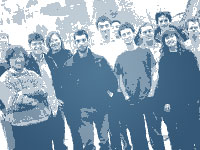Talbot
Together with my friends Andre Henriques, Mike Hill, and John Francis, I started the annual Talbot Workshops. These workshops have been supported by NSF Grants DMS-0512714, DMS-0805838, DMS-1007096, and DMS-1406356. From 2008, the workshops were run by Sheel Ganatra, Owen Gwilliam, and Hiro Tanaka, and more recently by Eva Belmont, Saul Glasman, Gijs Heuts, Inbar Klang, and Dylan Wilson.
The workshops thusfar, along with their respective mentors, have been:
- Geometric Models for Elliptic Cohomology (2004), with Stephan Stolz
- The Geometric Langlands Program (2005), with David Ben-Zvi
- Automorphism Groups of Manifolds (2006), with Michael Weiss
- Topological Modular Forms (2007), with Mike Hopkins
- Affine Lie Algebras and Chiral Structures (2008), with Dennis Gaitsgory
- Fukaya Categories (2009), with Paul Seidel
- Twisted K-Theory and Loop Groups (2010), with Constantin Teleman
- Non-Abelian Hodge Theory (2011), with Carlos Simpson
- Calculus of Functors (2012), with Gregory Arone and Michael Ching
- Chromatic Homotopy Theory (2013), with Mark Behrens and Tyler Lawson
- Motivic Homotopy Theory (2014), with Marc Levine
- Little Disks Operads (2015), with Kathryn Hess and Dev Sinha
- Equivariant Stable Homotopy Theory (2016), with Douglas Ravenel and Mike Hill
- Obstruction theory for structured ring spectra (2017), with Maria Basterra and Sarah Whitehouse
- Model-independent theory of infinity-categories (2018), with Emily Riehl and Dominic Verity
- Moduli Spaces of Manifolds (2019), with Soren Galatius and Oscar Randal-Williams
Here is the workshop homepage, which includes pictures and information about past workshops, along with notes from some of the workshops.
We published a book about TMF based on the 2007 workshop. A preliminary version, made available with the permission of the AMS, is available in pdf; there were about four hundred corrections made between that and the final version, which is available from the AMS in print.
—–
The Talbot workshops have now inspired the creation of a few workshops with a similar format and pedagogical approach. These include:
- Symplectic Field Theory (2010, MIT, with Tobias Ekholm)
- Fukaya categories via microlocal sheaf theory (2011, MIT, with David Nadler)
- Theory and applications of polyfolds (2012, MIT, with Helmut Hofer)
- SYZ mirror symmetry (2013, MIT, with Mark Gross)
- Operator Algebras and Conformal Field Theory (2010, Oregon, with Andre Henriques)
- Cluster Algebras and Lusztig’s Semicanonical Basis (2011, Oregon, with David Speyer)
- Categorical representation theory (2012, Oregon, with David Ben-Zvi)
- Quantum/affine Schubert calculus (2013, Oregon, with Allen Knutson)
- Kazhdan–Lusztig theory and Soergel bimodules (2014, Oregon, with Ben Elias)
- Positivity in combinatorial algebraic geometry (2015, Oregon, with June Huh)
- Knot homologies, Hilbert schemes, and Cherednik algebras (2016, Oregon, with Jacob Rasmussen)
- Symplectic duality (the Abelian case) (2017, Oregon, with Ben Webster)
- Deligne-Lusztig theory (2018, Oregon, with Olivier Dudas)
- Foundations of tropical geometry (2019, Oregon, with Diane Maclagan and Jeff Giansiracusa)
- Invariants of structured ring spectra (Euro Talbot 2015, Klosters CH, with B. Dundas and B. Richter)
- Topological aspects of quantum field theories (Euro Talbot 2016, Winterberg DE, with C. Schommer-Pries and P. Teichner)
- Dualities in algebra, geometry, and topology (Euro Talbot 2017, Lower Saxony DE, with J. Greenlees and M. Hill)
- Free loop spaces (Euro Talbot 2018, Fishbach bei Dehn DE, with N. Wahl and A. Oancea)
- Algebraic K-theory (Euro Talbot 2019, Rheinbollen DE, with B. Antieau and D. Gepner)
